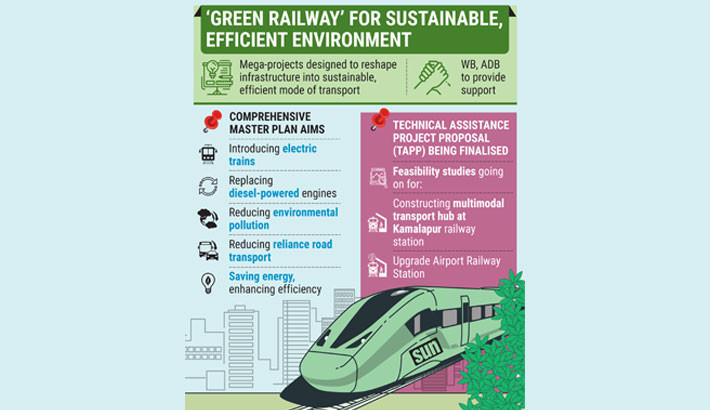
The government is undertaking a major initiative to revamp the country’s railway network, aiming to reduce the burden of road freight transportation and develop a more environment-friendly system.
With support from the World Bank, the comprehensive master plan will introduce electric trains on certain routes, replacing diesel-powered engines and reducing environmental pollution. This ambitious effort to create a “Green Railway” system involves several mega-projects, designed to reshape the country’s railway infrastructure into a more sustainable and efficient mode of transport.
Reducing road traffic and pollution
Currently, road transportation dominates freight and passenger movement in Bangladesh, with 96% of goods being transported via roads. Only about 4% of the country’s cargo is moved by rail or waterways.
This heavy reliance on road transportation not only increases fossil fuel usage but also exacerbates environmental pollution.
To address these issues, the government is taking steps to reduce road traffic and minimise pollution through the development of a Green Railway system. By shifting more cargo transportation to railways, the country aims to lower fossil fuel consumption, reduce carbon emissions, and ease road congestion.
The country’s current railway system heavily depends on diesel for train engines, which is a significant source of pollution. To combat this, Bangladesh Railway has launched initiatives to introduce electric trains on specific routes, marking a major step towards cleaner, more sustainable transportation.
Mega projects for a green railway
As part of the Green Railway transformation, several mega projects will be implemented. The government is preparing to finalise the Technical Assistance Project Proposal (TAPP), which will evaluate the routes for these projects and determine the costs involved in their full implementation. This feasibility study is expected to analyse the total cost of the projects, the completion timeline for development proposals (DPP), and the activities required for successful execution.
The total estimated cost for the preparatory technical assistance project is Tk93.51 crore. The funding will be shared between the government (Tk28.37 crore) and the World Bank (Tk65.14 crore). The project is expected to run from January 2025 to December 2026.
Upgrading railway infrastructure
In addition to transitioning to electric trains, Bangladesh Railway is focusing on improving its infrastructure. Key areas of development include the construction of multimodal transport hubs, which will facilitate the efficient movement of both goods and passengers.
For example, feasibility studies are being conducted for the construction of a multimodal transport hub at the Kamalapur Railway Station. Similarly, studies will be done to upgrade and rebuild station facilities at the Airport Railway Station to enhance multimodal transport capabilities.
Other major projects include developing rail connectivity between Foujderhat and the Chattogram Goods Port Yard, as well as upgrading the yard itself. Additionally, railway connections for the Mirsarai Economic Zone will be improved. The World Bank has shown initial interest in financing these critical infrastructure investments, which will be key to reducing road congestion.
World Bank’s role in financing
The World Bank is providing significant financial support for these efforts. The bank’s financing will help Bangladesh meet its climate change goals by building environmentally friendly railways. However, before this support can be fully realised, the government must finalise the project proposals, and the DPPs must be completed. Once finalised, these mega projects are expected to reduce the overall cost of freight transport, improve operational efficiency, and create a more sustainable transport network.
Al Fattah Md Masudur Rahman, the additional director general (infrastructure) of Bangladesh Railway, told the Daily Sun that climate change is a growing global issue, and the government is committed to addressing it through these large-scale initiatives. The focus is on transforming the railway sector into a greener, more sustainable transport system, which will help reduce pollution, save energy, and enhance overall efficiency.
Electric rail system and future plans
One of the major changes proposed under the Green Railway initiative is the introduction of electric trains, which will replace diesel-powered engines. Neighboring countries like India already operate electric trains, but Bangladesh has yet to implement this on a wide scale. The government plans to introduce electric trains on the Narayanganj-Joydebpur route as part of an investment project funded by the Asian Development Bank (ADB).
The electric traction project aims to develop an electric train system similar to the metro rail system, using overhead wires to supply power to the trains. In July 2023, Bangladesh Railway signed a $5.24 lakh contract with Turkey-based company Tumas to conduct feasibility studies and detailed design work for the project. The feasibility study for 348.16 kilometers of track has already been completed, covering key segments of the railway network, including Narayanganj-Dhaka-Chattogram and Tongi-Joydebpur routes.
The main goal is to transform these tracks into electric traction systems by 2032, with the full operation of electric trains expected to begin by 2033. The system will include both main and commuter lines, with speeds of up to 120 km/h, which can later be upgraded for higher speeds. The electric rail system will not only reduce pollution but also cut transportation costs, save fuel, and make travel more efficient for passengers.
Expected economic benefits
The introduction of electric trains and improved rail infrastructure is expected to bring significant economic returns. The commuter line (Narayanganj-Joydebpur) is expected to generate a 24% economic return, while the main line (Narayanganj-Dhaka-Chattogram) could see a 41% return. These improvements will benefit both the economy and the environment, offering a more sustainable and cost-effective alternative to road transport.
Al Fattah Md Masudur Rahman also emphasised the importance of reducing road transport pressures by shifting more freight to rail. By improving railway infrastructure and efficiency, the government aims to reduce road traffic, lower fuel consumption, and provide a more eco-friendly solution for transporting goods across the country, he added.








